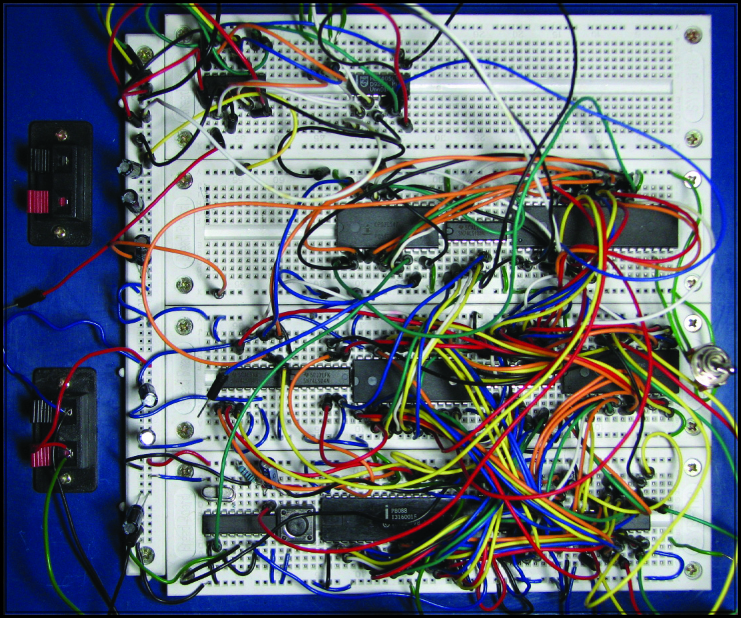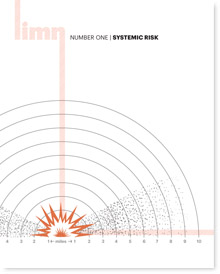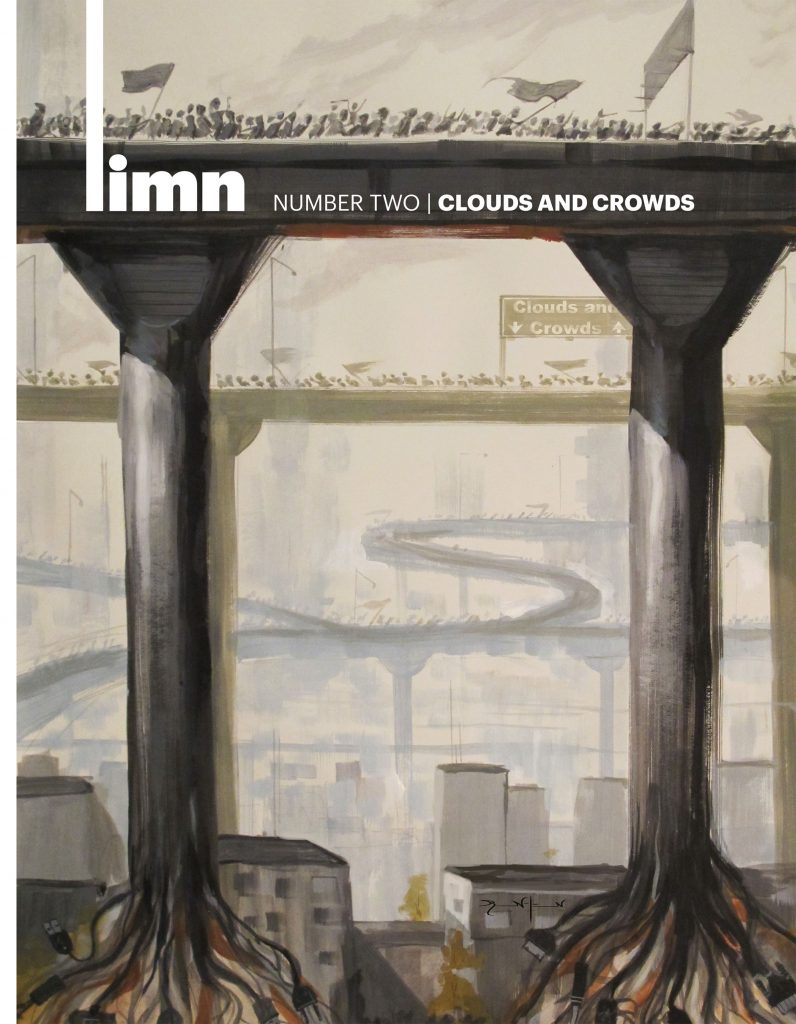Limn, 0-2: Prototyping Prototyping / Systemic Risk / Crowds and Clouds (2010-2012)
Filed under magazine | Tags: · big data, cloud computing, crowdsourcing, data mining, economy, financial crisis, internet, networks, politics, social media, surveillance

Limn, 0: Prototyping Prototyping, Nov 2010
“Before there was LIMN, there were several different prototypes. The first was occasioned by a conference: on prototypes. Held in Madrid in November of 2010, and organized by Adolpho Estalella and Alberto Corsín Jimenez, it was a conference for which this issue was imagined as a kind of pre-conference publication–another riff on the prototype. Many of the problems LIMN seeks to address were worked out in part through this conference and the publication: from the use of new media, to the function of conferences and conference papers, to the idea of a publication that precedes or determines a social event. Issue Number Zero was very much a prototype, and bears the traces of that concept and the discussion of it by the generous participants.”
Contributors: George Marcus, Marilyn Strathern, James Leach, Alberto Corsin Jimenez and Adolfo Estalella, Alex Wilkie, Nerea Calvillo, Javier Lezaun, Lucy Suchman, Lina Dib, Michael Guggenheim, Alain Pottage
HTML (updated on 2019-7-8)

Limn, 1: Systemic Risk, Jan 2011
“Systemic risk has become a central topic of expert discussion and political debate amidst the financial crisis that began in 2008, but it also has resonances across many other domains in which catastrophic threats loom – including internet security, supply chain management, catastrophe insurance, and critical infrastructure protection. In this issue, we invited scholars to contribute genealogical and conceptual framings that inform critical inquiry into this increasingly important concept. The result is not a traditional collection of academic articles but a set of brief, preliminary reflections, prepared on short notice, that address a common set of questions, along with a handful of documents, links, images and videos that illustrate different aspects of the concept.”
Contributors: Benjamin Sims, Deborah Cowen, Myriam Dunn Cavelty, Elizabeth Cullen Dunn, Christopher M. Kelty, Philip Bougen, Stephen J. Collier, Andrew Lakoff, Onur Ozgöde, Douglas R. Holmes, Rebecca Lemov, Brian Lindseth, Martha Poon, Grahame Thompson
HTML (updated on 2019-7-8)

Limn, 2: Crowds and Clouds, Mar 2012
“This issue of LIMN focuses on new social media, data mining and surveillance, crowdsourcing, cloud computing, big data, and Internet revolutions. Rather than follow the well-worn paths of argument typical today, our contributors address the problems in new ways and at odd angles: from the power and politics of statistics and algorithms to crowdsourcing’s discontents to the capriciousness of collectives in an election; from the focus group and the casino to the worlds of micro-finance and data-intensive policing. Together they raise questions about the relationship of technology and the collectives that form in and through them.”
Contributors: Christopher Kelty, Alain Desrosières, Lilly Irani, Chris Csikszentmihályi, Gabriella Coleman, Nick Seaver, Emmanuel Didier, Alek Felstiner, Tarleton Gillespie, Roma Jhaveri, Daniel Kreiss, Natasha Dow Schüll, Rebecca Lemov, Maria Vidart, Amira Pettus, Jonathan R. Baldwin, and Ruben Hickman
HTML (updated on 2019-7-8)
“Limn is somewhere between a scholarly journal and an art magazine. It is an attempt to communicate and display ongoing scholarly research. Limn outlines contemporary problems. It draws material from networks of experts in the social and human sciences and is intended to be timely, diverse in perspective, authoritative, well written and beautifully designed. The focus is on contemporary problems in our global, politically interconnected, technologically intense culture: problems of infrastructure, ecological vulnerability, economic interdependence, and relentless technological invention.”
Editors: Stephen J. Collier, Christopher M. Kelty, Andrew Lakoff
Creative Commons BY-SA 3.0 Unported License
David Parry (ed.): Ubiquitous Surveillance (2011-)
Filed under living book | Tags: · data mining, law, privacy, search, surveillance, web

“In 1996 when John Perry Barlow wrote A Cyberspace Independence Declaration, internet pioneers hoped that the online world Bartlow was describing would come to pass. While Barlow’s rhetoric was admittedly ‘grandiose,’ his central claim, that the internet was a place of freedom separate from the limits of the physical world, reflected the utopic atmosphere of the time. The technological revolution, in particular the rise of the digital network, seemed to point to a future ‘where anyone, anywhere may express his or her beliefs, no matter how singular, without fear of being coerced into silence or conformity’ (Barlow, 1996). While not everyone in the late 90s could be characterized as a cyberutopian, the dominant mood harbored a sense that the digital network would bring with it newfound, unregulatable freedoms.” (from Introduction)
Publisher Open Humanities Press
Living Books About Life series
View online (wiki/PDF/HTML articles)
View online (map interface to the articles)
PDF (PDF’d Introduction with hyperlinked articles)
Gary Hall (ed.): Digitize Me, Visualize Me, Search Me: Open Science and its Discontents (2011-)
Filed under living book | Tags: · computing, data, data mining, data visualisation, digital humanities, knowledge, networks, open access, open data, open knowledge, open science, open source, publishing, science, search, web
![]()
“One of the aims of the Living Books About Life series is to provide a ‘bridge’ or point of connection, translation, even interrogation and contestation, between the humanities and the sciences. Accordingly, this introduction to Digitize Me, Visualize Me, Search Me takes as its starting point the so-called ‘computational turn’ to data-intensive scholarship in the humanities.
The phrase ‘the computational turn’ has been adopted to refer to the process whereby techniques and methodologies drawn from computer science and related fields – including science visualization, interactive information visualization, image processing, network analysis, statistical data analysis, and the management, manipulation and mining of data – are being increasingly used to produce new ways of approaching and understanding texts in the humanities – what is sometimes thought of as ‘the digital humanities’.” (from Introduction)
Publisher Open Humanities Press
Living Books About Life series
View online (wiki/PDF/HTML articles/videos)
PDF (PDF’d Introduction with hyperlinked articles)

